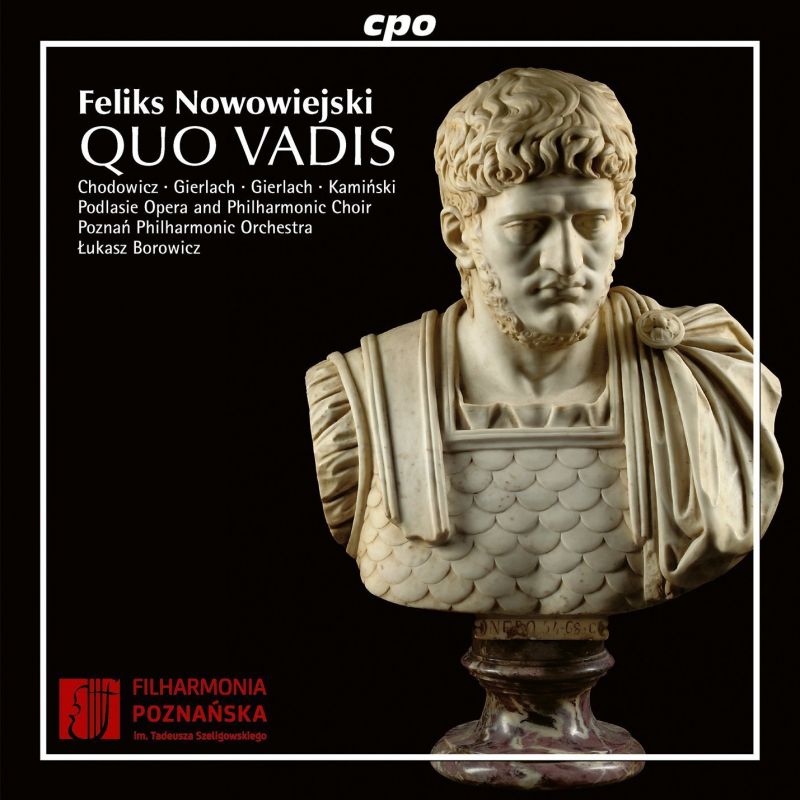NOWOWIEJSKI Quo vadis
View record and artist detailsRecord and Artist Details
Composer or Director: Feliks Nowowiejski
Genre:
Vocal
Label: CPO
Magazine Review Date: AW17
Media Format: CD or Download
Media Runtime: 95
Mastering:
DDD
Catalogue Number: CPO555 089-2

Tracks:
| Composition | Artist Credit |
|---|---|
| Quo vadis |
Feliks Nowowiejski, Composer
Feliks Nowowiejski, Composer Łukasz Borowicz, Conductor Podlasie Opera and Philharmonic Choir Poznan Philharmonic Orchestra Robert Gierlach, Baritone Sławomir Kamiński, Organ Wioletta Chodowicz, Soprano Wojtek Gierlach, Bass |
Author: Ivan Moody
Nowowiejski studied with Bruch and Taubert in Regensburg and Berlin, and his music is unquestionably Germanic rather than Slavic in character. Nor should this be surprising – the composer’s birthplace, Barczewo, was then a part of Prussia, so this cosmopolitanism was there from the start. Echoes of the German tradition writ large may certainly be heard (Wagner, Liszt, and a talent for counterpoint that argues a solid acquaintance with Bach), but in his booklet note, Borowicz points out that later in life Nowowiejski moved in the direction of Szymanowski and Roussel.
The work is divided into four ‘scenes’, presenting Sienkiewicz’s story through only three characters (the Apostle Peter, Ligia and the commander of the Praetorian Guard): the lion’s share is given to the chorus. There is much bombast and fanfare in the first two scenes, as they describe the pomp and ceremony of ancient Rome, finishing with the thrilling ‘Christiani ad leones!’. The third scene describes the suffering of the Christians under Nero’s persecution and Ligia’s imploring them to flee from the city. Here the music becomes more tender, more mystical, the orchestration less dominated by brass, and with some fine writing for the bass soloist (Peter, sung by the outstanding Wojtek Gierlach) and choir. The organ is also employed, lending Peter’s exhortation to his fellow Christians an appropriately solemn, liturgical atmosphere. But this is only one aspect of the drama, as Peter’s steadfastness becomes apparent, and Nowowiejski takes full advantage of his huge forces to underline the instability of the situation. The soprano soloist (Ligia) has a particularly dramatic and impressive aria, ‘O Panie, nasz Święty przewodniku’, outstandingly sung by Wioletta Chodowicz, and which makes memorable use of a solo violin.
The final scene moves from the darkness of the ‘deep, deep, dark night’, through the brief but pivotally transformative ‘Quo vadis’ aria (to which baritone soloist Robert Gierlach gives his all) to the triumphant final chorus foreseeing Peter’s martyrdom, culminating in a remarkable double fugue and final chorus of praise and ‘Amen’. This is grand oratorio, in the sense that Gerontius is; it takes the listener on a dramatic journey in an almost cinematic fashion, made utterly convincing by this superb recorded performance. It so happens that there is another excellent recording of the work, which uses the original German libretto. Which to buy? I would suggest both.
Discover the world's largest classical music catalogue with Presto Music.

Gramophone Digital Club
- Digital Edition
- Digital Archive
- Reviews Database
- Full website access
From £8.75 / month
Subscribe
Gramophone Full Club
- Print Edition
- Digital Edition
- Digital Archive
- Reviews Database
- Full website access
From £11.00 / month
Subscribe
If you are a library, university or other organisation that would be interested in an institutional subscription to Gramophone please click here for further information.




